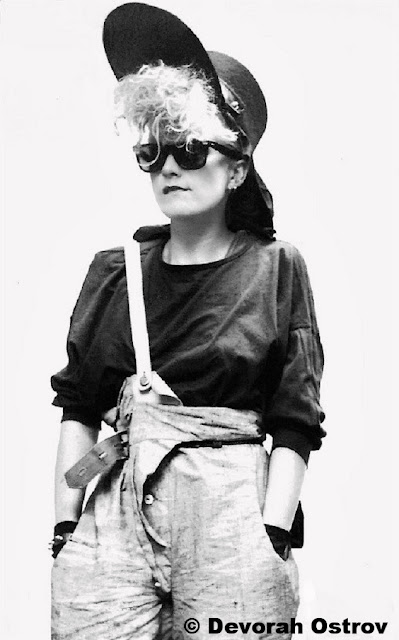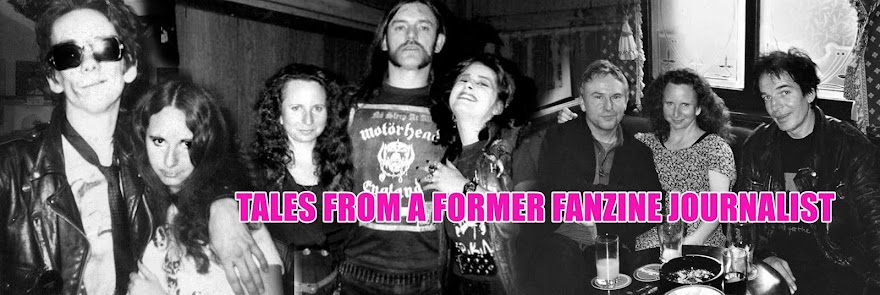Originally published in Rave-Up #6 (1983)
Interview by Devorah Ostrov
 |
| Alannah Currie, Joe Leeway & Tom Bailey backstage at the Kabuki Theatre in San Francisco - March 1983 Photo: Devorah Ostrov |
As I write this, the Thompson Twins are the biggest thing in pop music. Their latest single, "Love on Your Side," from the album Quick Step & Side Kick, is topping several different charts at once, and tickets for their extensive US and UK tours have sold out. Melody Maker even reported that when Alannah goes out in public, she has to disguise herself as an old hag to avoid being mobbed!
After struggling for several years to get noticed and having undergone a radical change of lineup, this has all happened super-fast! When I first met the band a few months ago, they were a critically praised but not especially well-known pop outfit who'd had a US dance club hit with "In the Name of Love." After the show, Alannah promised me an interview "next time."
"If we're not too famous to talk to fanzines," she added in jest.
 |
| Alannah Currie backstage at the Kabuki - March 1983 Photo: Devorah Ostrov |
Well, they actually are too famous for fanzines now. But Alannah kept her promise.
So, prior to their headlining set at the Kabuki, I found myself sitting backstage with Tom Bailey, Joe Leeway, and Alannah Currie discussing their massive rise to fame, and the effect it's had on the band and their fan base.
Tom: It's like, really MEGA! See, we've always been at a cult level...
Joe: It's totally over the top! The last gig we did in Staten Island, we said, "After the encore, no one come up onstage. Please!" And everyone just came up onstage.
Alannah: When it started happening [people getting onstage with the group], it was very spontaneous. We were trying to break down the barriers between the band and the audience. Instead of just being very voyeuristic and watching a band, you've got to join in and help create the event.
Tom: It was a sudden rush! And I think that was the first break... or one of the first steps away from just playing music. It was the first kind of non-musical event.
Rave-Up: Has the live show itself changed dramatically since I last saw you?
Tom: We haven't really changed it very much because we've been more or less consistently touring. We've had to go through sacking various personnel and getting new people. I mean, in terms of not changing very much, that's quite true. But in terms of dealing with human beings, we've gone through a whole lot just getting this production on the road.
Rave-Up: It does seem as if it's a lot more business-oriented now than it used to be. Does that take some of the fun out of it for you?
 |
| Tom Bailey at the Warfield in SF - May 1984 Photo: Devorah Ostrov |
Alannah: No! Definitely not.
Tom: It's much more exciting! In fact, we are not musicians. We see ourselves perhaps more appropriately as a business.
Alannah: We're more like a production company. We deal with music, and we deal with videos.
Tom: We're a communications company.
Rave-Up: "Love on Your Side" has crossed over to several different charts. What would you attribute that to?
Tom: It's probably because there was no prejudice towards us. I mean, as soon as we arrived [in the US], a lot of black radio stations stopped playing us because they could suddenly see us. We suddenly didn't fit into what their image of a "black band" was all about. Similarly, some AOR stations thought we were a little too risqué visually, so they stopped playing us as well.
Rave-Up: Do you think MTV showing the video for "Lies" on regular rotation helped push the group over here?
Tom: Sure! And that's quite exciting for us because we're just about to release our second video over here [for "Love on Your Side"], and we think it's 100 times more powerful than the "Lies" one.
Rave-Up: You've been so busy lately. Have you been able to give any thought to your next album?
Tom: We haven't really thought too much about our next album because we're touring and promoting Quick Step & Side Kick. We want to see that pushed a little bit more.
 |
| Alannah & Tom with their copies of Rave-Up #6 backstage at the Day on the Green - September 1983. Photo: Devorah Ostrov |
Joe: We've always been a common-sense band. Basically, we need to consolidate what we're doing at the moment. We won't be going out on a massive tangent, that's for sure. We've just got to consolidate and further push the single.
Rave-Up: I've heard that most of your US shows have sold out.
Tom: In New York, we did two nights at the Ritz!
Joe: There were 400 people locked out at the Ritz, and the weather...
Tom: It was pouring rain! It was so embarrassing.
Rave-Up: Were you expecting that sort of reception over here?
 |
| Joe Leeway at the Warfield, San Francisco - May 1984 Photo: Devorah Ostrov |
Alannah: No!
Joe: We didn't know what it was going to be like. I suppose that's where you have to rely on other people analyzing things for you and saying what you're worth.
A journalist from Lowrider magazine voices his concern about the lack of guitars on Quick Step & Side Kick, which leads to a lively conversation about passion and dinosaurs.
Tom: Guitars sneak into one track, and it's really boring! They took four hours to do something we could have done in 7-1/2 minutes.
Alannah: Guitars can be played really well, but we've had several years of having two guitars, and everything we write having to do with those two guitars. Almost everything that can be done brilliantly on a guitar has been done already — it's not new. Whereas synthesizers are new! With technology, there's more sounds; more differences come out.
Tom: If you're not used to technology, it could seem overbearing. You can over-reflect on the essence of technology, so people use synthesizers to make very stark, bleak sounding music.
Alannah: And then also, you can get some great sounds! You can mix very organic sounds with very synthetic sounds, which is what we're trying to do. So, even if your vocals might be, like ours, sarcastic and a bit cold, or not terribly impassioned...
 |
| Alannah Currie backstage at the Day on the Green - Sept 1983 Photo: Devorah Ostrov |
Tom: The vocabulary of emotion in pop music is very cliché. All those "Hey baby, let's get down and groove," or "Hey baby, my life is a misery since you left me," soulful wailings and things... They're all rather empty of emotion. They're just like a formula, you know. I think people who are quite inhibited and let emotions sneak out of them under stress and strain are actually more passionate.
Joe: I don't know what the big deal is, screaming out for passion. We're living in a synthetic age. Passion is no big deal.
Alannah: I have this theory that since the beginning of rock and roll, it's been men doing it, right? And men, as we all know, are emotional cripples because they can't express themselves. They've been brought up not to cry and not to show emotion. So, music is the perfect outlet. And because men have always been in control of the rock and roll business, they write these songs that are a total outlet for their emotions. But they need a stage and a performance to do that! Now that there are more women involved in groups and writing songs, there's also been a change in mental attitudes. It's not so important to go out there and do these massive wailings and screechings anymore, because they're doing that in their day-to-day lives. So, then they start looking for other things to talk about and sing about.
Tom: And in fact, we are quite passionate in a subliminal way.
Alannah: I mean, why is passion far more appreciated than a sense of humor or wit, or something completely off the wall, like dinosaurs? Why is passion more important than dinosaurs?
(Many thanks to Rave-Up reader Rodney Klein who kindly forwarded me this long-lost interview from issue #6)
